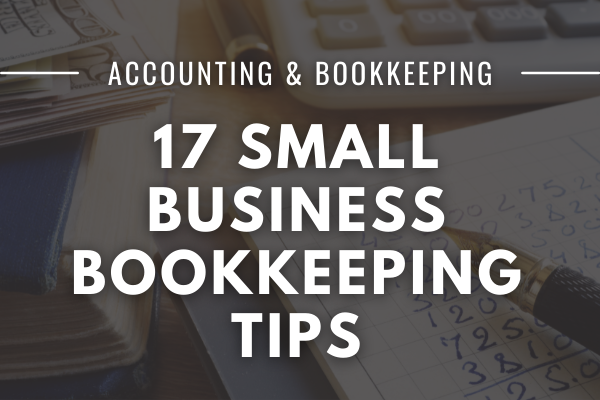Bookkeeping Tips for Small Businesses
Having a robust bookkeeping system is a crucial component of efficiently running a business. Regardless of the size of your business it is important to keep your books up to date, easily accessible, and accurate. Furthermore, proper bookkeeping provides you with vital information. Bookkeeping keeps you informed about your business’s financial health and puts you in the best position to minimize your tax burden. In this article we will focus on business owners who are taking it upon themselves to handle the difficult task of bookkeeping. Even with our small business bookkeeping tips, we highly recommend you hire a professional to review your books during the year to ensure you’re maximizing your deductions and minimizing your tax liability.
Below are 17 small business bookkeeping tips to guide you along your bookkeeping adventure
Contents
- Invest Time in Understanding Bookkeeping Basics
- Schedule “Bookkeeping Time” Daily
- Monitor Your Transactions on a Weekly and Monthly Basis
- Have Immediate Access to Financial Data
- Keep Personal and Business Finances Separate
- Document & Deduct Expenses That Are for Personal & Business Use
- Go Digital with Your Payroll
- Classify Your Employee Status Correctly
- Hire a Professional Payroll Service
- Create a Simple but Functional Chart of Accounts
- Consider Accepting Digital Payments from Customers
- Don’t Overlook Managerial Accounting
- Hire a Reliable Bookkeeper
- Don’t be Afraid to Ask Questions
- Keep Your Records Organized
- Maintain Detailed Inventory Records
- Stay Confident in Your Bookkeeping Strategy
Small Business Bookkeeping Tip #1
Invest Time in Understanding Bookkeeping Basics
As accounting professionals, we have seen on many occasions business owners who make seemingly small mistakes. These small mistakes can turn into thousands of dollars’ worth of penalties, interest, and fees. It is imperative that as a business owner you take the time to learn the foundational aspects of the bookkeeping process. This includes proper setup of the chart of accounts, monthly reconciliations, and journal entry adjustments.
Because you are reading this, you are well on your way to learning what it takes to handle the bookkeeping for your small business. Investing in yourself and taking the time to learn bookkeeping basics can help catch critical errors before they become disastrous and save you time and money.
Small Business Bookkeeping Tip #2
Schedule “Bookkeeping Time” Daily
Yes, every day.
Being a business owner, it is easy to get behind on categorizing and logging transactions into a bookkeeping software. However, if you keep prioritizing other aspects of your business, you can lose track of what each transaction was for, forcing you to back track and look at each receipt and invoice one at a time. This is clearly avoidable, complicates the bookkeeping process, and takes valuable time from your schedule as a business owner.
In our experience, it is significantly easier to maintain a bookkeeping schedule if you commit to a specific time each day. We would even recommend making an appointment on your calendar. Doing so will help ensure that the bookkeeping process is as efficient, painless, and accurate as possible.
Small Business Bookkeeping Tip #3
Monitor Your Transactions on a Weekly and Monthly Basis
You might be thinking, “I already have daily time slotted for my business bookkeeping. Why would I need to also schedule time to monitor my transactions?”
We understand your time is at a premium, and this process does not need to be lengthy, but monitoring an overview of your transactions on a weekly and monthly basis is necessary.
For incoming cash-flow, you should match both your cash and cash-less deposits with the receipts on your bank statements. Some things to monitor:
-
- Are your employees making cash deposits on the correct schedule?
- Do the deposits that are recorded match what was actually deposited?
- If you are getting your credit card deposits through a merchant services provider, do the deposits match what was recorded?
- Also, keep an eye on your merchant’s processing fees. Have they changed?
- On the outgoing side of things, you should monitor your check, disbursements, and payments activity.
- Does the payee name and dollar amount match the checks paid?
- Did you receive invoices that match your outgoing payments?
- Are there any unauthorized payments either via written check or ACH payment?
Monitoring this overview of transactions on a weekly and monthly schedule will allow you to catch any unintended or malicious inconsistencies on your books. It will also allow you to compare your expenses on a regular basis so you are aware of your month to month profitability and can make business decisions in real time based on your income and expenses.
Small Business Bookkeeping Tip #4
Have Immediate Access to Financial Data

Finding a bookkeeping solution for your small business that provides easy access to your current financial data can make maintaining your books far less daunting.
As your bookkeeping falls behind, it becomes increasingly difficult to assess the overall financial health of your business and make strategic decisions when you need it most. Regardless of your businesses size, having immediate access to vital financial information will allow you to make smarter choices and grow your business.
Imagine having an inaccurate view of your cash flow forecast because of outdated information on outstanding balances for accounts receivable or accounts payable. Can you see how could lead to making counterproductive or costly choices?
One way to ensure immediate access to your financial data is to use cloud accounting software.
Cloud based software for small business accounting and bookkeeping offers the ability bring real-time reporting to small business owners. This can automate much of the more tedious tasks necessary for bookkeeping. However, it does not remove the need for expert accounting and bookkeeping guidance.
Small Business Bookkeeping Tip #5
Keep Personal and Business Finances Separate
Keeping your personal finances entirely separate from your business finances is imperative.
When starting your own small business, you are forced to wear many hats. To make life easier for yourself in the future and be in the best position in case of an IRS audit, it’s best to set up a separate bank account for your company as soon as possible. Once set up, this will save you quite a bit of time and energy and protect your business.
Keeping separate accounts keeps you from having to go through every transaction you’ve made and decide if it was a personal or business expense. Think about every time you swipe your card or complete an online checkout. Now imagine having to check each transaction at the end of the day, or week, or if you get very behind every month!
It is also beneficial to have a separate credit card for your business. This way, when you’re going through your invoices and receipts, you will know that all the expenditure has gone on business-related items, helping you to speed up the bookkeeping process.
Small Business Bookkeeping Tip #6
Document & Deduct Expenses That Are for Personal & Business Use
If you use something for both business and personal purposes (such as a cell phone), you can deduct a percentage of the expenses on your tax return based on the percentage of business use. However, you will need to keep detailed call logs and other documentation to back up the deduction. Likewise, if you use your car for your business, keep detailed records and include your mileage log in your bookkeeping so you can deduct a percentage of your vehicle expenses on your tax return. Depending on your type of tax entity, a journal entry or reimbursement entry will need to be made in your books.
Small Business Bookkeeping Tip #7
Go Digital with Your Payroll
One of the best tips for local, small businesses is to ditch the paperwork and go digital.
Too many small businesses still use paper to manage their hourly employees. By using a software-oriented solution, local business owners can:
-
- eliminate paperwork
- store their employee records in the cloud
- and import hours directly into payroll and accounting software
This makes running payroll a breeze, simplifies bookkeeping, and saves hours each week for busy owners and managers.
Small Business Bookkeeping Tip #8
Classify Your Employee Status Correctly
Companies tend to have full-time staff, part-time staff, contract workers, or a combination of all three. Properly classifying employees and ensuring that they remain compliant with federal and state tax rules is crucial to avoid costly and disruptive mistakes at tax time.
Small Business Bookkeeping Tip #9
Hire a Professional Payroll Service
Some of the highest and most frequent penalties and interest are charged for late payroll returns or late payroll tax payments. Payroll compliance and payroll taxes can be complicated. We usually recommend for small business owners to use a professional payroll service to ensure accuracy in the process and mitigate risk. We can either set you up with a payroll company and can often get you a discount, or we can train you on how to run your own payroll through your accounting software like QuickBooks.
Talk To An Accounting Professional Now!
Small Business Bookkeeping Tip #10
Create a Simple but Functional Chart of Accounts
The chart of accounts is a list of accounts that are used to categorize every financial transaction that your business generates. Your chart of accounts will reflect your entire operation, which is why it is considered the backbone of your bookkeeping system. Accounting software usually comes with a preset list of accounts that will start you on your way, but as your business grows, you need to know how to modify your list. Some of the main things to remember when creating your chart of accounts are:
- Set up accounts that you need and nothing more. Don’t over-categorize.
- Keep them generic. Instead of creating accounts with customer or vendor names, it is more functional to list an account per type of transaction instead.
- Make sure to select the correct account type for each account, or there will be errors in your financial statements.
Small Business Bookkeeping Tip #11
Consider Accepting Digital Payments from Customers
Trying to run a company and keep up with all of the physical paperwork that comes with it can be terrifying in and of itself. Allowing your customers or clients to use digital payments has a few benefits.
You can automate your payment system and help streamline the job of bookkeeping. You have less physical paperwork to keep track of and organize. And it makes it even easier for you to get paid, which is never a bad thing!
Digital payments can be in the form of eCheck, mobile payments, ACH, or if you’re really trendy even bitcoin.
Small Business Bookkeeping Tip #12
Don’t Overlook Managerial Accounting
Many small businesses tend to focus their accounting on taxation and compliance. That’s fine, and necessary, but it’s also to ensure that you have measures in place to allow for managerial accounting. If you have the ability to access and manipulate your accounting data in a way that readily informs your business decisions, it can help you plan for growth.
When small businesses get started, they are typically in “crisis mode”. Usually, they are simply trying to cope with operational challenges as they come to them. However, entrepreneurs should take the time to structure accounting categories and procedures that allow for easy analysis, trend spotting, and business planning, in addition to simple tax compliance. The benefits of making time to create a more robust accounting infrastructure from the start will return exponential benefits, allowing easy scalability and growth.
Additionally, it is important to keep track year over year based on month so you can evaluate seasonality, anticipated trajectory, and growth. If you track monthly based on category of income, it can help you see which areas of your business are increasing, which are decreasing, and areas for potential improvement.
You may also find areas where you should invest more because your ROI is higher in particular areas. It’s important to not just track annual numbers, but monthly and quarterly as well to assess them in the shorter term as well as over time. There may be small fluctuations, but this helps you build trends.
Small Business Bookkeeping Tip #13
Hire a Reliable Bookkeeper
We cannot stress enough the importance of realizing quickly that bookkeeping is not your thing. It very well might not be for your employees either. However, if you know from the start that you have no bandwidth to deal with day-to-day bookkeeping, it is best to hire a professional bookkeeping service for small business.
Hiring a reliable, professional bookkeeper helps make your life so much easier by staying on top of your bookkeeping needs.
But you should choose your bookkeeping for small business service provider carefully.
Make sure your bookkeeping service has at least one CPA on their staff. Having someone with the experience to assist you in finding every deduction and tax advantage is a vital aspect of bookkeeping services for small business.
Also, don’t just look for the lowest fee available. Having someone who will be available to spend time with you learning about your business and teaching you how to get the most out of it should be the primary concern.
Small Business Bookkeeping Tip #14
Don’t be Afraid to Ask Questions
An important tip is to ask questions when you don’t know the answer. Properly categorizing revenue and expenses is important. Proper categorization can save you and (if you have one) your accountant a lot of time at year end. If you do have an accountant, don’t forget, your accountant bills you for the time they spend, so take advantage of this by learning what you don’t know – ask questions.
By staying on top of your bookkeeping, you’ll be able to focus on your weaknesses, efficiently manage expenses, and be better positioned to grow your business. Feel free to contact us and ask as many questions as you’d like. We are here to help!
Small Business Bookkeeping Tip #15
Keep Your Records Organized
One of the most important bookkeeping tips for small businesses is to stay organized during the entire year so you are not in a bad situation come tax time. You should:
-
- Gather and organize receipts and other required documentation, such as mileage logs and documentation for furniture or equipment purchases on a regular basis (see tip #2).
- Check all 1099 forms for accuracy and report them on your tax return. Wait to receive them before you file.
- Prepare to list all income received, including cash, checks, credit cards, PayPal, and bartering income.
- You might also want to consider investing in a quality document management solution.
It’s best to invest in a quality document management solution to help streamline and simplify the process of managing financial documents, such as day-to-day expenses, payables, receivables, receipts, and invoices. This will significantly help you reduce the amount of time spent working on your reconciliation. It also allows you to exchange and share files with your accountant—from receipts to invoices to tax forms.
Small Business Bookkeeping Tip #16
Maintain Detailed Inventory Records
 Small businesses often don’t have the benefit of a large staff to take care of tasks like inventory maintenance, which are important but often overlooked. Having a proper inventory management process can help small businesses prevent employee theft or misplacement of merchandise. These records can also help businesses track customer shopping trends and ensure efficient buying in the future.
Small businesses often don’t have the benefit of a large staff to take care of tasks like inventory maintenance, which are important but often overlooked. Having a proper inventory management process can help small businesses prevent employee theft or misplacement of merchandise. These records can also help businesses track customer shopping trends and ensure efficient buying in the future.
Small Business Bookkeeping Tip #17
Stay Confident in Your Bookkeeping Strategy
When it comes to bookkeeping, confidence in execution is key. As small business owners who may be taking on bookkeeping for the first time, it’s essential to feel secure in your company’s bookkeeping and compliance. Bookkeeping can be an overwhelming task, but there is a proper solution for your unique needs. If you are questioning your ability to strategically guide your small business in its accounting practices, a collaborative partnership may be ideal. Especially as technology and opportunity for data analysis in accounting evolves, don’t be afraid to ask for help from an expert.

